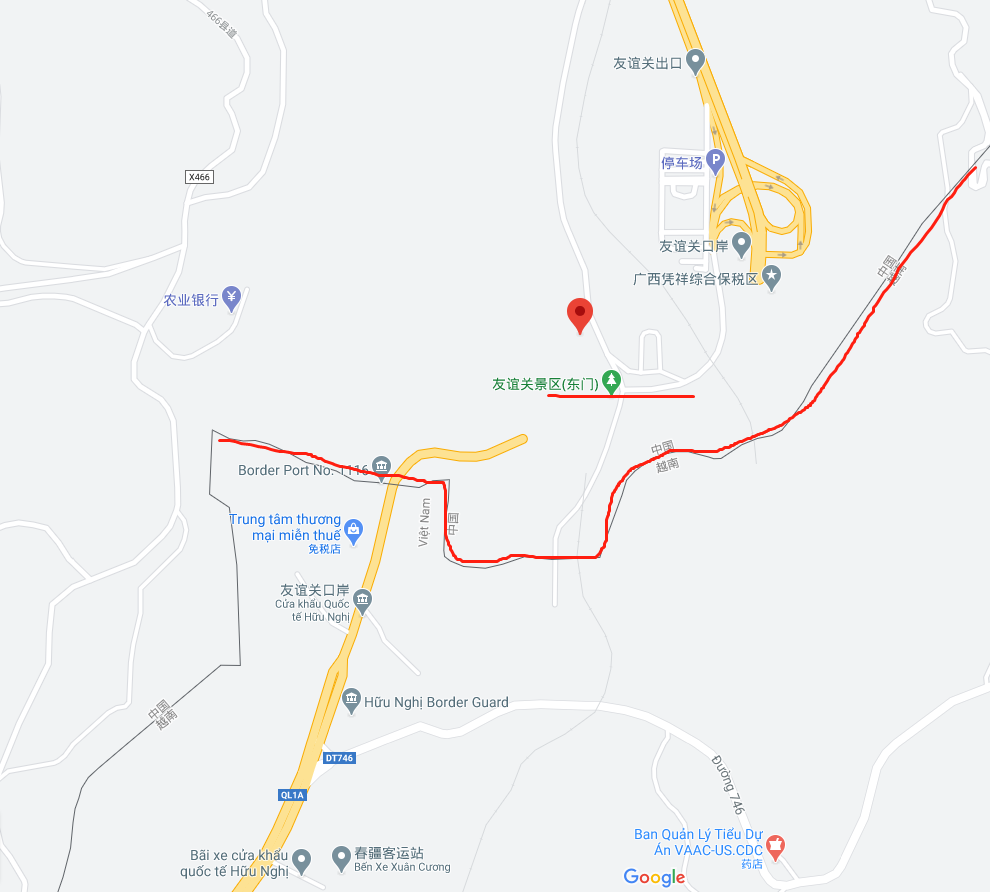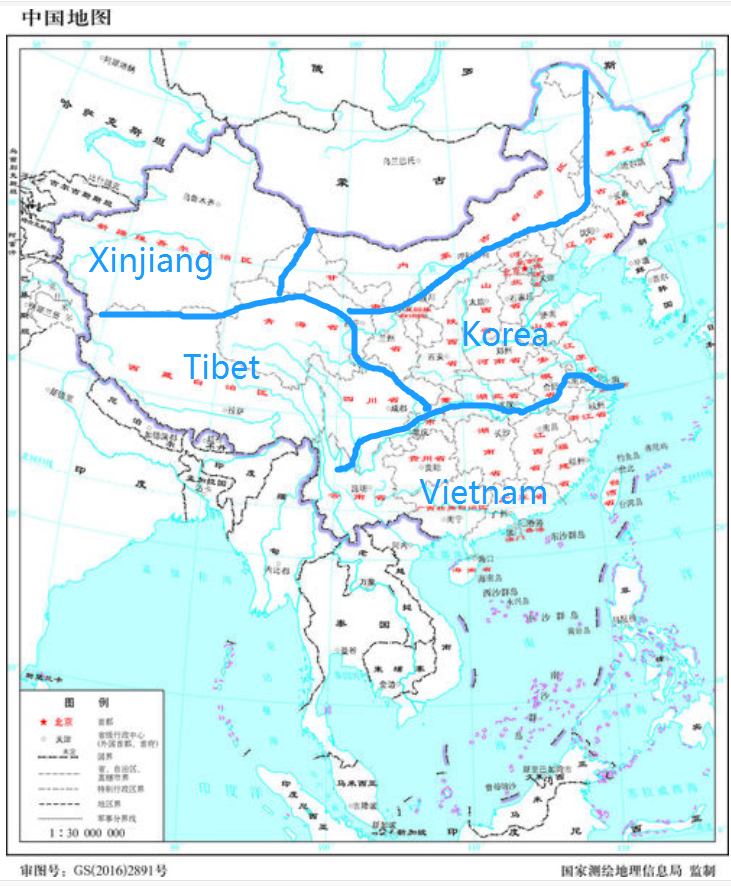It's very interesting that on quora there are always questions posted anonymously with tendentious content, and then some Vietnamese accounts are able to spot them in the first place and reply with enthusiasm, and this question is one of them.
Vietnam defeated China in 1979, well, right!
One, a defeated China took control of all the disputed areas along the Sino-Vietnamese border after the war, prior to which part of the disputed areas were controlled by China and part by Vietnam. After the 1979 war, the defeated China, took control of all the disputed areas and the victorious Vietnam lost all the disputed areas.
In 1999 China and Vietnam signed a border treaty. The land borders were adjusted and all the land that Vietnam had lost in the fighting was given to China, including South Suppressing Pass, the traditional border and entry point between Vietnam and China, which caused widespread frustration in the Vietnamese community.
Youyi Pass, which was built in the early Ming Dynasty under the name " South Suppressing Pass" (simplified Chinese: Zhennan Pass; Vietnamese: TrấnNam Quan), was renamed in 1953 as " South In 1965, its name was changed again to the current Friendship Pass, reflecting the close political, military and economic ties between the People's Republic of China and North Vietnam during the then ongoing Vietnam War.

Traditionally, this pass was the exact border between China and Vietnam, hence the historical Vietnamese saying: "N QuancViệtNam tatrảidàit Nami Nam QuanđếnmũiCàMau", which translates as "From Ai Nam Quan Vietnamese country all the way to Phu Quem Ou". However, the most recent pass has been controlled by China, and in June 2000 the border treaty between China and Vietnam confirmed that some of the Vietnamese territory along the Sino-Vietnamese border, namely in Cao Bang and Lang Son provinces, had been ceded to China.
This is very interesting and it shows that Vietnam does not mind its own territory.
Vietnam is still willing to cede territory to China even after it has been victorious.
Secondly, according to a comprehensive report by the BBC, the defeated Chinese army suffered about 27,000 casualties and the victorious Vietnamese army about 80,000.
Vietnamese sources claim that the Chinese People's Liberation Army suffered a total of 62,500 casualties, and Wei Jingsheng, an anti-government pro-democracy activist in China, told the Western media in 1980 that the Chinese army had lost 9,000 men killed and about 10,000 wounded in the war. Leaks from the Chinese military indicate that China suffered 6,954 deaths.
The Vietnamese government has never officially announced any news of its actual military casualties. China estimates that Vietnam lost 57,000 soldiers and 70,000 militiamen during the war. Official Vietnamese newspapers claimed that Vietnam suffered more than 100,000 civilian deaths during the Chinese invasion, and earlier, on 17 May 1979, reported statistics of heavy damage to industrial and agricultural property.
III. A defeated China received a significant amount of support from ethnic minorities in Vietnam
The Chinese received a significant amount of defectors from the Thu Lao ethnic minority in Vietnam during the war.
During the war China received as migrants the entire A Lù based population of the Phù Lá ethnic minority.
China received so many defectors from the ethnic minorities in Vietnam that it raised shock among Vietnam which had to launch a new effort re-assert dominance. China received so many defectors from the ethnic minorities in Vietnam that it raised shock among Vietnam which had to launch a new effort re-assert dominance over the ethnic minorities and classify them.
Post Vietnam War, insurgency against Vietnam lasted among the indigenous Mon-Khmer and Malayo-Polynesians of the Central Highlands ...Assistance was sought from China by the Hmong ethnic minority
The border was frequently crossed by Chinese, Lao, Kinh, Hmong, Yao, Nung, and Tai. The Laotian Hmong and FULRO were both supported against Vietnam by China and Thailand.
The Laotian Hmong and FULRO were both supported against Vietnam by China and Thailand.
In the spring of 1979, some 8,000 Goans were expelled from Hanoi to the southern 'New Economic Zone' and the Hmong and other ethnic minorities were partially resettled from the northernmost provinces. In response to the defection of Hoàng VănHoan, a purge was launched to cleanse the Vietnamese Communist Party of pro-Chinese elements and personnel who had succumbed to the advancing Chinese army during the war. 20,468 members of the party were expelled in 1979.
V. The failed Chinese army also inflicted the following losses on Vietnam
The Vietnamese Communist Party organ, the People's Newspaper, published a statement entitled "A Preliminary Table of Some Presently Visible Losses as of the End of March 1979", which gave a preliminary account of some of the losses incurred by the Vietnamese side during the month-long Sino-Vietnamese border war. The details were as follows.
1. Cities destroyed: four out of a total of four, or one hundred per cent.
2. Communes destroyed: 320 out of a total of 320, or 100 per cent.
3. The area of houses destroyed in the cities: 600,000 square metres.
4. The number of people who lost their homes in the cities: 150,000.
5. The number of houses destroyed in the countryside: 45,000.
6. The number of people who lost their homes in the countryside: 200,000.
7. Primary and secondary schools destroyed: 735 out of a total of 904, or 81%.
8. Number of students without schooling: 180,000.
9. Kindergartens destroyed: all 691 out of a total of 900 were destroyed.
10. Number of children without a place to study: 14,000.
11. Number of teachers who lost their schools: 5,570.
12. Hospitals and health posts destroyed: four hundred and twenty-eight out of a total of four hundred and thirty were destroyed, or 99.5 per cent. Of these; all four of the total number of provincial hospitals were destroyed, accounting for one hundred percent; twenty-four of the total number of twenty-six county hospitals were destroyed, accounting for ninety-two percent; all four hundred of the total number of communal health stations were destroyed, accounting for one hundred percent.
13. Destroyed forest farms: thirty-eight out of a total of forty-two were destroyed, accounting for ninety per cent.
14. Farms and agricultural stations destroyed: forty-one.
15. Cattle killed or robbed: 157,000 out of a total of 260,000 were killed or robbed, or sixty per cent.
16. Pigs killed or looted: 244,000 out of a total of 305,000, or eighty per cent.
I find some of the Vietnamese interesting, and the Vietnamese also like to say that Cambodians are very grateful to the Vietnamese (there are 200,000 people of Vietnamese descent in Cambodia, and Cambodia refuses to issue them with identity documents; for those interested, do a search for "Cambodian Vietnamese").
I also came across a Vietnamese saying that Chinese characters were invented by Vietnamese ancestors (someone in Korea has also suggested that Chinese characters were invented by Korean ancestors), and I wondered why Vietnam does not use Chinese characters now if this is the case.
The funniest thing is that the Vietnamese say that their ancestors controlled south of the Yangtze River. Contrast this with the Koreans who also say that their ancestors controlled north of the Yangtze River.

The Tibetan separatist movement people say that Tibet has been an independent country since ancient times. The Western media say: Mongolia and Xinjiang are not Chinese.
So where are the Chinese? Hahahahahahahahahaha

